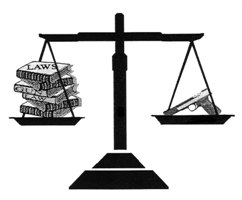by Dave Workman | Senior Editor
 The US Supreme Court ruled recently that gun buyers must make it clear on their federal Form 4473 if they will keep the firearm or subsequently sell it, and whether they are the actual purchaser—upholding the conviction of a Virginia man for making a “straw purchase”—but a leading Second Amendment legal scholar is blasting the ruling as “legislating from the bench.” The majority opinion in Abramski v. United States was written by Associate Justice Elena Kagan. In it, she noted, “No piece of information is more important under federal firearms law than the identity of a gun’s purchaser—the person who acquires a gun as a result of a transaction with a licensed dealer.” But Nelson Lund, a constitutional scholar and Second Amendment expert at George Mason School of Law, asserted to TGM via e-mail that the ruling smacks of judicial activism.
The US Supreme Court ruled recently that gun buyers must make it clear on their federal Form 4473 if they will keep the firearm or subsequently sell it, and whether they are the actual purchaser—upholding the conviction of a Virginia man for making a “straw purchase”—but a leading Second Amendment legal scholar is blasting the ruling as “legislating from the bench.” The majority opinion in Abramski v. United States was written by Associate Justice Elena Kagan. In it, she noted, “No piece of information is more important under federal firearms law than the identity of a gun’s purchaser—the person who acquires a gun as a result of a transaction with a licensed dealer.” But Nelson Lund, a constitutional scholar and Second Amendment expert at George Mason School of Law, asserted to TGM via e-mail that the ruling smacks of judicial activism.
“Five members of the Supreme Court have decided to make it a federal crime for a lawful gun owner to buy a firearm for another lawful gun owner,” Lund said in a statement sent to TGM by a public relations firm. “No federal statute says any such thing. The Justices are once again legislating from the bench, which violates the Constitution, and enacting a retroactive criminal law, which is even worse.”
The case involves a former police officer, Bruce Abramski Jr., who. bought a pistol at a discount for his uncle and then was reimbursed.
The transfer of that gun was done through a federally licensed firearms dealer. Both men could legally own the firearm in question, a Glock semi-auto. Abramski, of Virginia, was convicted of making a straw purchase, despite his argument that, “So long as the person at the counter is eligible to own a gun, the sale to him is legal under the statute.” Kagan was joined in her majority opinion by Justices Ginsburg, Breyer, Sotomayor and Kennedy.
A dissent was written by Justice Antonin Scalia and joined by Chief Justice John Roberts and Justices Thomas and Alito.
At one point, on Page 14 of the dissent, Scalia argued, “On the majority’s view, if the bureaucrats responsible for creating Form 4473 decided to ask about the buyer’s favorite color, a false response would be a federal crime.”
Kagan’s majority opinion does allow for the purchase of firearms as gifts, or as a raffle prize. But on Page 10 of her majority opinion, Kagan made this observation: “The overarching reason is that Abrams- ki’s reading would undermine—in- deed, for all important purposes, would virtually repeal—the gun law’s core provisions…
“As noted earlier,” Kagan added, “the statute establishes an elabo- rate system to verify a would-be gun purchaser’s identity and check on his background. It also requires that the information so gathered go into a dealer’s permanent records… The twin goals of this comprehensive scheme are to keep guns out of the hands of criminals and others who should not have them, and to assist law enforcement authorities in investigating serious crimes… And no part of that scheme would work if the statute turned a blind eye to straw purchases—if, in other words, the law addressed not the substance of a transaction, but only empty formalities.”.



